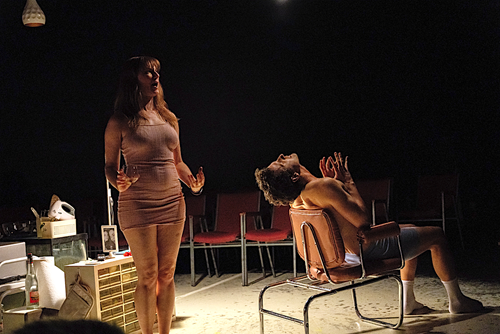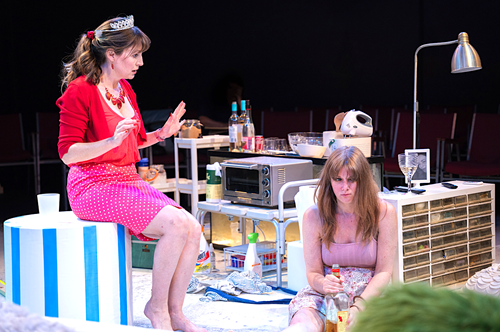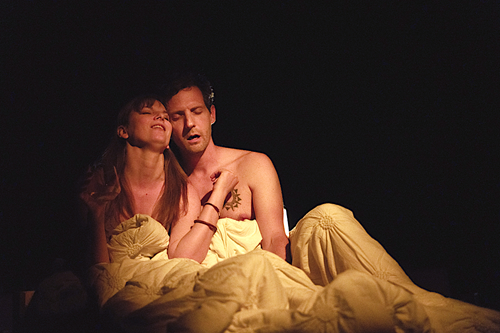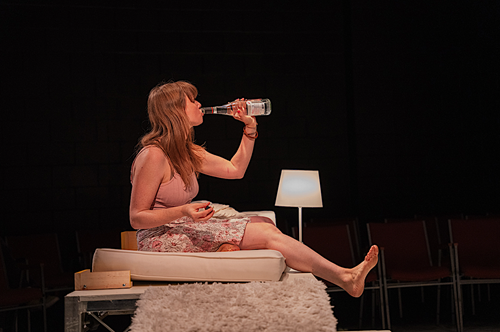
Robert St. Martin
On stage at the Atwater Village Theatre is Abby Rosebrock’s new play Dido of Idaho, a dark love comedy that builds its tale around the plaintive aria of Dido in Purcell’s Baroque opera Dido and Aeneas. This well-staged production by the Echo Theatre Company is directed by Abigail Deser who has the action set in the middle of the theatrical space with audience chairs surrounding it. Dido’s plaintive suicide aria opens the play with Nora, a lovelorn Baroque musicologist in bed with her sometime lover – an English professor at the University of Idaho. Nora, played by Alana Dietze, is at crossroads in her life as she struggles with her desire for the English professor Michael (Joby Earle) who leaves to teach poetry to prisoners at the state penitentiary, leaving hard-drinking Nora in his bed with a bottle of wine to finish off. This is the start of what seems to be a standard plot television novella until strange things begin to happen.

The title of the play is derived from the story of Dido and Aeneas. In the course of his travels, Aeneas stops in Carthage, where he has a passionate love affair with the recently widowed Queen Dido. As soon as he learns that the gods have assigned him another, more glorious fate, Aeneas abandons Dido, whereupon she kills herself in rage and despair. Just how self-destructive Nora actually is remains questionable but her self-characterization as a modern-day Dido shapes the odd direction that play takes. Nora has found herself in a hopeless love relationship because her lover John is already fairly happily married to a cherry woman named Crystal (Nicole DuPort), a former Miss Idaho who is a bit of beauty consultant.

“I wanted to write about a woman who feels hopeless of ever being loved, and to imagine a way out of that for her,” Rosebrock explained in an interview. “The only way to make that kind of play bearable for me or for anyone experiencing it is to make it as funny and exciting as possible. My hope has been that crafting a lot of physical comedy, wordplay and rapid-fire punchlines, all situated in something like realism, makes the story something people can really inhale, even as it challenges them.”

After John leaves to go off to do his weekly poetry workshop at the men’s prison, Nora falls asleep in John’s bed and is discovered by Crystal, went she comes back home from visiting her dying mother in the hospital. The confrontation is strained but Crystal, with her strangely empathetic heart, is led to believe that Nora was just visiting John for work on a common research project and happened to fall asleep on the bed. After using her seemingly well-intentioned support group methods to bolster Nora’s flagging self-identify, baking her cookies and offering Hallmark platitudes. Then she suddenly realizes that Nora is having an affair with her husband. The tables turned, Crystal attacks Nora with a vengeance that seems straight out of a Mexican novella.

Abby Rosebrock’s Dido of Idaho is about the self-destructive nature of romantic and sexual relationships. Suddenly the story moves into dramatic violence and a hospital scene where the non-responsive Nora seems hovering between life and death – somehow caught in the original Dido’s predicament but without the operatic overtones. Blinded by fate, this Dido of Idaho decides to travel back in time in her own mind to figure out the source of her unhappiness. The transition is a bit confusing but this is theatre and we are expected to suspend disbelief as we account Nora on a post-hospitalization trip to the Rocky Mountains where she seeks comfort from her estranged mother, Julie (Julie Dretzin) and Julie’s new female partner Ethel (Elissa Middletone). It is not clear if these scenes and conversations are real or imagined by Nora – and that is where the play seems to faulter. Nora was abandoned by her mother years before and it is not clear why she believes that she can return and fix the past.

As director Deser sees it: “Nora faces her own potential annihilation because she only knows how to exist in the reflection of the male gaze. Self-love is the only beacon that might help her find her way back to safe shores.” The play has no clear resolution and it is difficult to believe that Nora’s own blindness to reality springs solely from childhood neglect by her mother. Perhaps the play is meant to address the predicament of women who embrace hopeless romantic relationships that will never prove satisfying or permanent. I was left with little pity for Nora despite her own inability to find herself without seeming to be an object of desire by men. The indifference of her mother withstanding, the only kind words come from Ethel, the kind-hearted lesbian partner of Nora’s own mother.
Abby Rosebrock is a Brooklyn-based writer and actress from South Carolina. Her work has been commissioned, developed and produced throughout New York City and across the country. Other full-length works include Wilma, Blue Ridge, Singles in Agriculture, Monks Corner and Ruby the Freak in the Woods.Abby is a proud alum of the writers groups at Clubbed Thumb, The Orchard Project and Ensemble Studio Theatre and is currently at work on a trilogy.
Dido of Idaho opened on Saturday, July 20, with performances continuing on Fridays and Saturdays at 8 p.m.; Sundays at 4 p.m.; and Mondays at 8 p.m. through August 26. Tickets are $34 on Fridays, Saturdays and Sundays. Atwater Village Theatre is located at 3269 Casitas Ave in Los Angeles, CA90039. For tickets: www.EchoTheaterCompany.com or call (747) 350-8066.